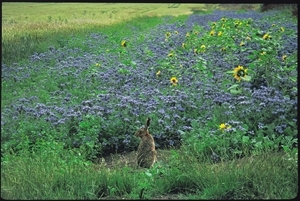 The way we manage the land is changing. A new report highlights a way which is better for wildlife, crop production, soil and water, as well as people.
The way we manage the land is changing. A new report highlights a way which is better for wildlife, crop production, soil and water, as well as people.
A ground-breaking study reviewing The Role of Agroecology² in Sustainable Intensification¹ has taken a multi-national approach. It was commissioned by the Land Use Policy Group (LUPG), funded by Scottish Natural Heritage and Natural Resources Wales and written by two leading English farming research institutions; the Organic Research Centre, and the GWCT’s Allerton Project.
Dr Alastair Leake from the GWCT’s Allerton Project and contributor to the report explains; “We are now demanding more and more from our farmed land, requiring it to increase food production to cope with a rapidly expanding national population while delivering more for nature and people. To do this we need to have the right tools in the box and to share knowledge on how we inject agroecology into sustainable intensification.”
The 151 page report covers big issues and takes a close look at the relationship between sustainable intensification and agroecology. Both are wide ranging subjects and the report raises important questions, particularly on how readily these concepts will be adopted by the average farming business in England, Scotland and Wales without loss of productivity and economic viability.
An important element of the report is the review of agricultural systems, which involved a systematic comparison of the performance of conventional, integrated and organic farming techniques, based on a detailed literature review and contact with experts.
Alastair Leake says, “The report is very much knowledge and evidenced-based. We believe that agroecology has the potential to make a significant contribution to sustainable intensification in the future but sharing this knowledge will be crucial. Labelling different farming methods into organic integrated (IFM) or conventional is not helpful; good farming practice is good farming practice and we should share that knowledge together; we all have much to learn.”
Integrated Farm Management (IFM) was developed in response to some of the pest, weed and disease problems that had arisen from the simplification of crop rotations. The loss of key pesticides and the development of herbicide resistant weeds means that IFM has become a necessity for many Farmers.
Dr Leake concludes, “We have reached the point where we need to manage our wildlife and environment while feeding our people, but to do it better for both. Agroecology certainly shows a way forward. But we need to make the adoption of agro ecological practices by farmers easy, and seen as appealing, practical and profitable for them.”
A unique new partnership between the Daylesford Foundation, The Organic Research Centre and the GWCT’s Allerton Project called “Agricology” will advance this approach. This website-based project will bring together key research evidence and translate this into easy to understand advice. This will be followed up with practical workshops where the experts and interested farmers can develop their knowledge and experience together.
END
Photocaption: A new report on agroecology shows how farmed land can provide for wildlife as well as people and do it better for both. Photocredit: Malcolm Brockless, GWCT.
Notes to editors:
To download the full report, please visit: http://www.snh.gov.uk/docs/A1652615.pdf
- Sustainable Intensification means simultaneously raising yields, increasing the efficiency with which inputs are used and reducing the negative environment effects of food production
- Agroecology can be seen as part of a broader approach to sustainable intensification and attempts to reconcile environmentally sustainable goals by emphasising the application of ecological concepts and principles to the design and management of agricultural systems.
The Game & Wildlife Conservation Trust (GWCT) is an independent wildlife conservation charity which has carried out scientific research into Britain’s game and wildlife since the 1930s. We advise farmers and landowners on improving wildlife habitats and we lobby for agricultural and conservation policies based on science. We employ 14 post-doctoral scientists and 50 other research staff with expertise in areas such as birds, insects, mammals, farming, fish and statistics. We undertake our own research as well as projects funded by contract and grant-aid from Government and private bodies. The Trust is also responsible for a number of Government Biodiversity Action Plan species and is lead partner for grey partridge and joint lead partner for brown hare and black grouse. For Information, contact: Morag Walker – Head of Media, Telephone – 01425-652381 (direct 01425-651000) Mobile – 07736-124097 www.gwct.org.uk
GWCT’s Allerton Project farm, Loddington, Leicestershire - Farmland ecology research in the 1970s and 1980s carried out by the Trust has resulted in the majority of wildlife enhancing measures that we now see in today’s agri-environment schemes. The Trust’s 333 ha Allerton Project at Loddington is a mixed arable and livestock farm that is unique within the UK in having developed a wide range of practical ways of restoring wildlife and integrating this approach into the farm business. The result of these wildlife-friendly farming techniques is the dramatic increases in wild game, farmland birds and other wildlife. As well as research, the Trust runs a range of courses which aim to bring together the wider aspects of biodiversity and wildlife conservation to encapsulate all the important aspects of environmental management.